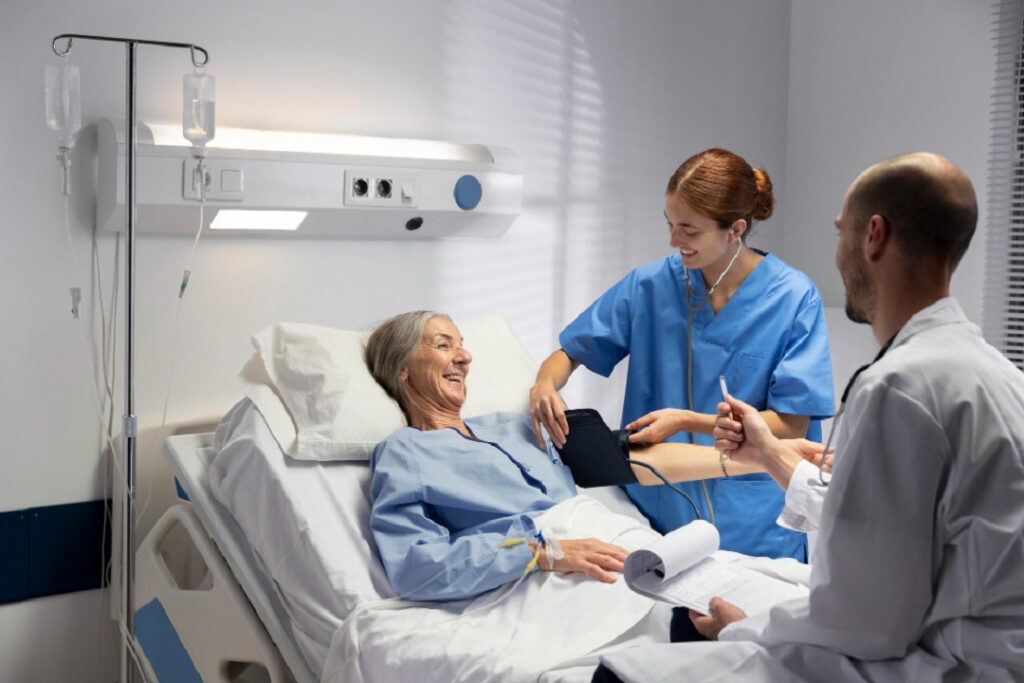The Need and Advantages of Studying NCLEX-RN for Nurses

Embarking on the journey of becoming a nurse involves more than just acquiring theoretical knowledge; it demands a demonstration of practical skills, critical thinking, and a commitment to delivering high-quality patient care. The NCLEX-RN (National Council Licensure Examination for Registered Nurses) emerges as a crucial milestone in a nurse’s career, addressing the evolving needs of the healthcare landscape and offering distinct advantages for those aspiring to excel in their profession. The Need for NCLEX-RN: 1. Licensure Requirement: The primary need for studying NCLEX-RN is to obtain licensure, a mandatory step for nurses aiming to practice in the United States. The exam serves as a standardized measure to ensure that nurses possess the essential knowledge and skills required for safe and effective patient care. 2. Quality Assurance in Patient Care: The dynamic and demanding healthcare environment necessitates nurses to be well-prepared and competent. By evaluating a nurse’s ability to apply theoretical knowledge in real-world scenarios, the NCLEX-RN ensures that healthcare professionals maintain a high standard of care, contributing to overall patient safety and well-being. 3. Adaptation to Changing Healthcare Landscape: Healthcare is an ever-evolving field with advancements in technology, treatment modalities, and patient care methodologies. Studying for the NCLEX-RN equips nurses with the latest evidence-based practices, enabling them to adapt to and thrive in a rapidly changing healthcare landscape. Advantages of Studying NCLEX-RN: 1. Career Mobility: One of the significant advantages of passing the NCLEX-RN is the enhanced career mobility it offers. Licensure opens doors to diverse job opportunities, allowing nurses to explore different specialties, healthcare settings, and even pursue advanced degrees in nursing. 2. Global Recognition: The NCLEX-RN is recognized not only within the United States but also internationally. This global recognition makes it easier for nurses to explore job prospects in other countries, contributing to a more interconnected and diverse nursing community. You can also read: Unveiling the NCLEX-RN Exam: Exploring Its Salient Features 3. Professional Credibility: Successfully passing the NCLEX-RN adds a layer of professional credibility to a nurse’s profile. It signifies that the nurse has met the rigorous standards set by the licensing authority, instilling confidence in employers and colleagues regarding their competency in providing high-quality patient care. 4. Focused Skill Development: Studying for the NCLEX-RN involves honing specific skills essential for nursing practice. From critical thinking and clinical judgment to effective communication and patient advocacy, the exam encourages nurses to develop a well-rounded skill set that goes beyond textbook knowledge. 5. Continuous Learning and Growth: The process of preparing for the NCLEX-RN encourages a mindset of continuous learning. It instills the importance of staying updated on the latest medical advancements, research findings, and evidence-based practices, fostering a commitment to ongoing professional development. 6. Enhanced Patient Outcomes: Ultimately, the core objective of the NCLEX-RN is to ensure that nurses can provide safe and effective care to their patients. By studying for and successfully passing the exam, nurses contribute to improved patient outcomes, creating a positive impact on the health and well-being of those under their care. In conclusion, studying for the NCLEX-RN is not just a requirement for licensure; it is a transformative journey that prepares nurses for the challenges and responsibilities of their profession. The advantages extend beyond career opportunities, encompassing personal and professional growth, global recognition, and a commitment to excellence in patient care. As nurses invest time and effort in preparing for the NCLEX-RN, they are not merely studying for an exam; they are investing in a fulfilling and impactful nursing career. Want to be a part of the Best NCLEX-RN Coaching Centre in Kerala? Join now: https://bghud.com/all-courses/
Unveiling the NCLEX-RN Exam: Exploring Its Salient Features

The NCLEX-RN (National Council Licensure Examination for Registered Nurses) stands out as a pivotal assessment for aspiring nurses, encompassing distinctive features that set it apart in the realm of nursing licensure exams. 1. Adaptive Testing Technology: The NCLEX-RN utilizes adaptive testing, a sophisticated technology that tailors the exam to the individual test-taker’s abilities. As candidates progress through the test, the adaptive nature adjusts the difficulty level of questions based on their previous responses, ensuring a more personalized evaluation. 2. Client-Centered Approach: Unlike traditional exams, the NCLEX-RN focuses on a client-centered approach. Questions are designed to assess the nurse’s ability to prioritize and manage client care, emphasizing critical thinking skills and decision-making in real-world healthcare scenarios. You can also read:The Importance of the NCLEX-RN Exam in European Countries: A Comprehensive Overview 3. Multimedia-rich Format: The exam incorporates multimedia elements, such as charts, graphs, and audio clips, reflecting the diverse nature of healthcare environments. This feature ensures that candidates are tested on their ability to interpret and respond to a wide range of information formats. 4. Integrated Nursing Process: The NCLEX-RN is structured around the nursing process—assessment, diagnosis, planning, implementation, and evaluation. This holistic approach assesses a nurse’s competence in applying these fundamental steps to ensure comprehensive and effective patient care. 5. Item Types Diversity: The exam includes various question types, such as multiple-choice, multiple-response, and fill-in-the-blank. This diverse format challenges candidates to demonstrate proficiency in different ways, enhancing the assessment’s thoroughness and accuracy. 6. Global Application: The NCLEX-RN is recognized not only in the United States but also in several other countries, making it a globally accepted standard for nursing licensure. This feature facilitates the mobility of nursing professionals, allowing them to practice in diverse healthcare settings worldwide. 7. Computerized Adaptive Testing (CAT): The computerized adaptive testing system adjusts the difficulty of questions in real-time based on the candidate’s performance. This dynamic approach ensures a more precise evaluation of a nurse’s knowledge and competency, enhancing the overall reliability of the examination. 8. Emphasis on Safe and Effective Care Environment: A significant portion of the NCLEX-RN focuses on the safe and effective care environment, assessing a nurse’s ability to create and maintain a safe and therapeutic healthcare environment for clients. This reflects the exam’s commitment to ensuring the highest standards of patient care. In conclusion, the NCLEX-RN exam is distinguished by its adaptive technology, client-centered approach, multimedia-rich format, integration of the nursing process, diverse item types, global applicability, and emphasis on safe and effective care. These exclusive features collectively contribute to the exam’s reputation as a comprehensive and reliable assessment for nursing licensure. Want to be a part of the Best NCLEX-RN Coaching Centre in Kerala? Join now: https://bghud.com/all-courses/
The Importance of the NCLEX-RN Exam in European Countries: A Comprehensive Overview

The Importance of the NCLEX-RN Exam in European Countries: A Comprehensive Overview 1. Global Recognition: The NCLEX-RN exam holds immense importance in European countries due to its global recognition. It is recognized as a standardized assessment that measures the competency of nursing graduates to practice safely and effectively. European countries often require foreign-trained nurses to pass the NCLEX-RN to ensure that they meet the same standards as their locally trained counterparts. 2. Quality Assurance: The NCLEX-RN exam serves as a quality assurance measure for European countries. By implementing this exam, they can ensure that nurses practicing within their healthcare systems possess the necessary knowledge, skills, and competencies to provide safe and competent care to patients. The exam assesses essential nursing concepts, critical thinking abilities, and clinical decision-making skills, which are vital for delivering high-quality healthcare services. 3. Standardization: The NCLEX-RN exam plays a key role in standardizing nursing education and practice across European countries. It provides a common benchmark for assessing the competence of nursing graduates, regardless of their country of origin. This standardization ensures that nursing professionals meet uniform criteria and are equipped to deliver consistent care, promoting patient safety and healthcare quality. 4. Mobility and Employment Opportunities: Passing the NCLEX-RN exam opens up a world of opportunities for nurses in European countries. It enhances their mobility and increases their chances of employment across different European nations. Many European countries have reciprocal agreements that recognize the NCLEX-RN as proof of nursing competence, allowing nurses to practice in multiple countries without undergoing additional exams or assessments. 5. Professional Development: The NCLEX-RN exam serves as a milestone in a nurse’s professional development journey. Successfully passing the exam not only validates their knowledge and skills but also boosts their confidence and professional credibility. It demonstrates their commitment to continuous learning and improvement, making them more marketable and sought after in the competitive job market of European countries. 6. Patient Safety: Patient safety is a top priority in healthcare systems worldwide, including in European countries. The NCLEX-RN exam ensures that nurses possess the necessary competencies to deliver safe and effective care to patients. By adhering to international standards and requiring nurses to pass the NCLEX-RN, European countries promote patient safety, minimize medical errors, and protect the well-being of their populations. 7. Professional Regulation: The NCLEX-RN exam aids in professional regulation within European countries. It provides a standardized assessment for regulatory bodies to evaluate the qualifications and competencies of nursing professionals. This regulation ensures that nurses meet the minimum requirements for licensure, allowing them to practice legally and ethically. It also establishes accountability within the nursing profession, maintaining public trust and confidence in the healthcare system. Final Thoughts: The NCLEX-RN exam holds immense importance in European countries and if you are looking for one of the best NCLEX-RN Coaching Centre in Kerala then B-GHUD Academy is the perfect choice. NCLEX-RN exam holds a global recognition, role in quality assurance, standardization of nursing education and practice, mobility and employment opportunities, professional development, focus on patient safety and contribution to professional regulation all contribute to its significance. Nurses who successfully pass the NCLEX-RN are equipped with the necessary competencies to excel in their careers, provide safe patient care, and contribute to the healthcare systems of European countries.
